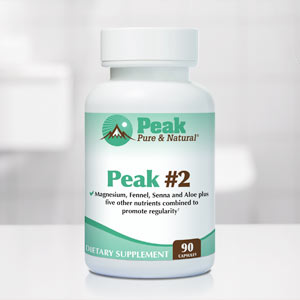Get Easy Health Digest™ in your inbox and don’t miss a thing when you subscribe today. Plus, get the free bonus report, Mother Nature’s Tips, Tricks and Remedies for Cholesterol, Blood Pressure & Blood Sugar as my way of saying welcome to the community!
Forgetting fiber over the holidays could do some lasting damage

Don’t we all love the holidays and especially the food? From Thanksgiving straight through to the new year, there’s plenty of it to enjoy. And yes, splurging is allowed!
But it makes it hard to always be on guard while watching our waistlines during this festive time. However, one way you can better control your weight, and most importantly, your health, is not to forget to include foods with plenty of fiber.
Fiber-rich foods help you feel full faster with fewer calories. But that’s not all…
Research has consistently shown that people who eat high-fiber diets have a reduced risk for heart disease, stroke, hypertension, certain gastrointestinal disorders, type 2 diabetes and certain cancers.
But national consumption surveys indicate that only 5 percent of the population meets the recommended daily fiber intake levels, which is shockingly low.
Hopefully, two recent studies that demonstrate the powerful effects of fiber on the entire body will have most of us changing our ways…
Lack of fiber does damage that’s hard to repair
Both studies, named for the lead researchers, started by feeding a group of mice a diet that was extremely low in fiber. And to no big surprise, the low-fiber diets rapidly led to weight gain, high blood sugar and insulin resistance in the mice.
But why?
The Bäckhed study found that mice developed problems with the protective mucus layer in the colon after just 3-7 days of eating the low-fiber diet: this mucus layer became more penetrable and bacteria were able to reach the epithelial cells of the colon, which is something you see with leaky gut disease.
The Gewirtz study observed that the colons of mice on the low-fiber diet shrank significantly in thickness. And not only did large amounts of gut bacteria die off after mice ate a low-fiber diet, but the mice also developed unhealthy imbalances of different gut bacteria strains.
“Both our paper and the Bäckhed paper are essentially reaching the same conclusion that the lack of fiber results in bacteria encroaching into the mucus layer, and those bacteria are promoting low-grade inflammation, contributing to metabolic syndrome,” says Andrew Gewirtz, who studies the intestinal epithelium at Georgia State University’s Center for Inflammation Immunity & Infection.
Metabolic syndrome is a cluster of conditions that increase the risk for heart disease, stroke and diabetes, and is indicated by symptoms including weight gain, high blood sugar and blood pressure as well as abnormal cholesterol levels.
After the fallout from the low-fiber diet, the two research teams tried different treatment approaches to repair the damage to the mice’s health…
Bäckhed’s research team found that a transplant of gut bacteria from a healthy mouse could undo some of the harmful changes to the colon mucus layer and supplementing the mice with Bifidobacterium (a beneficial bacteria) helped colon mucus growth issues. Inulin (a type of fermentable fiber) was necessary to lower the penetrability of the mucus layer.
Gewirtz and colleagues found that they could reverse some aspects of metabolic syndrome in the mice, like promoting weight loss and greater blood sugar control, but not triglyceride levels, by switching the mice to a diet of 20 percent inulin. However, the insulin supplements weren’t enough to return the mouse gut to its original bacterial diversity.
They concluded that, according to Gunnar C. Hansson, a co-senior author with Bäckhed and a professor in the Mucin Biology Group at the University of Gothenburg, Sweden, “Diets that lack fiber alter the bacterial composition and bacterial metabolism, which in turn causes defects to the inner mucus layer and allows bacteria to come close [encroach], something that triggers inflammation and ultimately metabolic disease,” says Hansson. “It is not enough just to add fiber to your diet; it also depends on which bacteria you carry.”
The importance of fiber and bacteria
Basically, there are three key players that keep a gut healthy:
- Fiber — roughage from plant-based foods.
- Prebiotics — a type of fiber the human body can digest that serves as “food” for gut bacteria.
- Probiotics — gut bacteria.
If you eat a balanced diet that includes both regular fiber and prebiotic fiber, like inulin, found in leeks, artichokes, bananas and chickory, you will be way ahead of the game. This balance of healthy fibers should keep your gut teeming with healthy bacteria.
Getting your fiber from whole-food sources is the best route, but we know most Americans eat much less fiber than they should. That’s why more of us are reaching for both fiber supplements and probiotics to bridge the gap. These studies demonstrated the importance of both not only in colon health but total-body health.
Just remember during the holidays, you may have a harder time eating what’s best for you. But these studies are proof that when you get your gut out of balance it’s not so easy to repair the damage.
Tips for adding more fiber
- Eat whole-grain products such as wheat bran, whole-wheat pasta, wild rice and barley
- Try to eat more fresh fruits and vegetables
- Lean on legumes, beans and peas. Try adding to a green salad or mix with fresh vegetables
- Eat healthy snacks, such as a handful of nuts and seeds. Low-fat popcorn and whole-grain crackers
- Stay clear of dried fruits, which have a lot of calories and added sugars
- Eat prebiotic foods which promote the growth of Bifidobacteria
- Eat fermented foods: plain natural low sugar yogurt, kimchi, sauerkraut, kefir, kombucha and tempeh
- Go slowly. Adding too much fiber too quickly can promote gas, bloating and cramping.
- Fiber supplements may be needed if dietary needs are not sufficient or if certain medical conditions are present such as diarrhea, constipation or irritable bowel syndrome.
- Drink plenty of water when adding fiber, allowing the natural bacteria in your gut to adjust to change.
Editor’s note: Did you know that when you take your body from acid to alkaline you can boost your energy, lose weight, soothe digestion, avoid illness and achieve wellness? Click here to discover The Alkaline Secret to Ultimate Vitality and revive your life today!
Sources:
Closing America’s Fiber Intake Gap — American Journal of Lifestyle Medicine (NCBI resources)
Dietary Fiber: Essential for a healthy diet — Mayo Clinic
PSA from your gut microbes: Enjoy the holidays, but don’t forget your fiber — Science Daily















